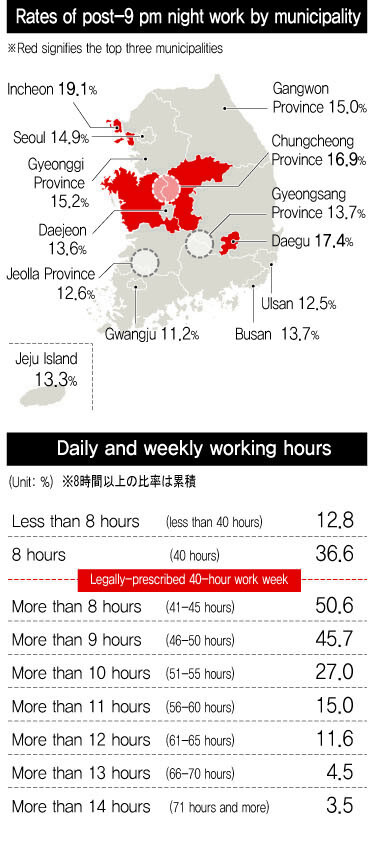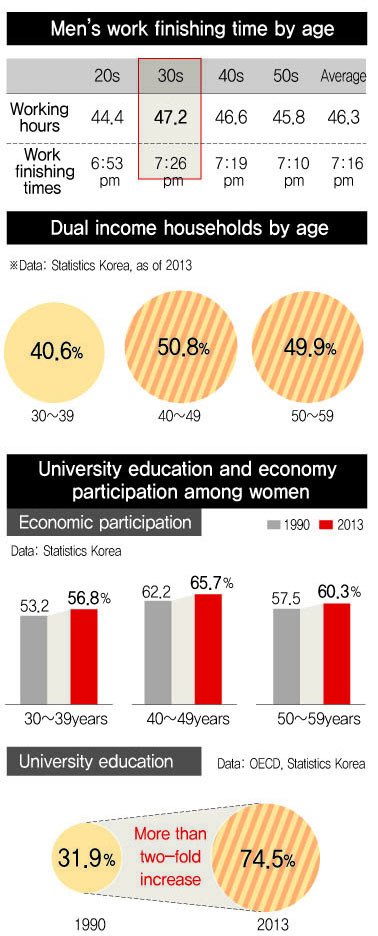hankyoreh
Links to other country sites 다른 나라 사이트 링크
Long work hours mean millions of families have no evenings together

By Jin Myeong-seon and Kim Hyo-jin, staff reporters
The husbands and fathers on the reality show “Dad! Where Are We Going?” and the variety show “Superman Is Back” are “supermen.” They come home from work and pitch in their fair share of the housework and child-raising.
It’s a very different story for the husband of 39-year-old Kim Hye-yeon, a working mother employed at a public enterprise. In his family’s eyes, he‘s simply never home.
The term “weekend couples” has come to refer to husbands and wives who live apart. This is not the case for Kim and her husband, who works at a corporation, but in reality they see each other only on weekends. Both of them often have to work nights, leaving little time during the week to sit down face to face for a simple conversation. To their seven-year-old daughter, Dad is a guest who visits on weekends. For all the talk about the importance of “kitchen table education,” Kim’s family usually eats together just once a week.
The first crisis for the couple came when their child care leave time ended.
“Our leave was used up, but the baby was still just a year old,” Kim recalled. “My husband and I never got to leave work on time, and we ended up taking the stress out on each other. It reached the point where I was drawing up divorce papers.”
“I’ve also had a number of friends and acquaintances who had their own divorce crises when their babies were young,” she added.
Kim has been trying to work things out with her husband recently, but six years of resentment doesn’t fade away overnight.
“I don‘t think we’ll ever be 100% again,” she admitted.

Collaborating with the Working Hours Center of the Korea Institute of Labor Safety and Health, the Hankyoreh analyzed the weekly working hours of wage earners in South Korea‘s 16 cities and provinces, using 2013 data from Statistics Korea’s regional employment survey. Out of 17,430,000 working people, some 4.7 million, or 27%, were found to be unable to leave work by eight in the evening. 2.6 million, or 15%, remained in the office until 9 pm. Over one in ten - 2.02 million, or 11.6% - worked until 10 pm, leaving them no time to do anything after work but sleep. Another 610,000, or 3.5%, reported working until midnight or later.
The disparity in working hours was greater for men and women in their 30s and 40s with young or teenaged children. Men between 30 and 39 worked an average of 47.2 hours per week, or 5.5 hours more than the 41.7-hour average for women in the same age group. Men aged 40 to 49 worked 46.6 hours per week, or 4.6 hours more than 42-hour average for women of that age range. For both age groups, men were found to finish work roughly one hour later than women. The numbers are empirical evidence of the threat the “eveningless day” poses to both the working and home lives of dual earner households with children.
According to data released in 2013 by Statistics Korea, South Korea has 5.05 million dual earner households, representing 42.9% of the 11.78 million households with a spouse. But while nearly half of all families have both parents working, the paradigm assigning all the housework and child care duties to just one spouse hasn‘t changed since the days of purely single-income families.
For the single earner, the typical paradigm involves long working hours. The idea is that the worker has to go the extra mile putting in time at the office to earn “recognition,” typically by working nights. The biggest issue for dual income households is when both spouses have to work nights, leaving their young child or children neglected in the evenings.
The situation also explains why the percentage of dual income households among thirty-somethings - an age group at its peak in terms of working activity, but also with more young children - falls below the overall average by a margin of 40.6% to 42.9%.
Please direct questions or comments to [english@hani.co.kr]

Editorial・opinion
![[Guest essay] Amending the Constitution is Yoon’s key to leaving office in public’s good graces [Guest essay] Amending the Constitution is Yoon’s key to leaving office in public’s good graces](https://flexible.img.hani.co.kr/flexible/normal/500/300/imgdb/original/2024/0416/8917132552387962.jpg) [Guest essay] Amending the Constitution is Yoon’s key to leaving office in public’s good graces
[Guest essay] Amending the Constitution is Yoon’s key to leaving office in public’s good graces![[Editorial] 10 years on, lessons of Sewol tragedy must never be forgotten [Editorial] 10 years on, lessons of Sewol tragedy must never be forgotten](https://flexible.img.hani.co.kr/flexible/normal/500/300/imgdb/original/2024/0416/8317132536568958.jpg) [Editorial] 10 years on, lessons of Sewol tragedy must never be forgotten
[Editorial] 10 years on, lessons of Sewol tragedy must never be forgotten- [Column] A death blow to Korea’s prosecutor politics
- [Correspondent’s column] The US and the end of Japanese pacifism
- [Guest essay] How Korea turned its trainee doctors into monsters
- [Guest essay] As someone who helped forge Seoul-Moscow ties, their status today troubles me
- [Editorial] Koreans sent a loud and clear message to Yoon
- [Column] In Korea’s midterm elections, it’s time for accountability
- [Guest essay] At only 26, I’ve seen 4 wars in my home of Gaza
- [Column] Syngman Rhee’s bloody legacy in Jeju
Most viewed articles
- 1[Guest essay] Amending the Constitution is Yoon’s key to leaving office in public’s good graces
- 2Faith the power of memory: Why these teens carry yellow ribbons for Sewol
- 3[Guest essay] How Korea turned its trainee doctors into monsters
- 4[Editorial] 10 years on, lessons of Sewol tragedy must never be forgotten
- 5US grants Samsung up to $6.4B in subsidies for its chip investments there
- 6[News analysis] Watershed augmentation of US-Japan alliance to put Korea’s diplomacy to the test
- 7How Samsung’s promises of cutting-edge tech won US semiconductor grants on par with TSMC
- 8Korea ranks among 10 countries going backward on coal power, report shows
- 9‘National emergency’: Why Korean voters handed 192 seats to opposition parties
- 10[Column] A death blow to Korea’s prosecutor politics